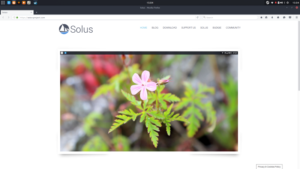Finding Solace in Solus Linux

There are so many reasons why you might want to try a new distribution. For all intents and purposes, the desktop has very few jobs when it comes to the “average” user. You need a desktop that:
- Runs a web browser; and if you’re a Google Docs user, you can skip the next item!
- Runs a productivity suite.
- (Optional) Can run a casual game or two.
- Can do these few jobs reliably and securely.
That’s it! And it doesn’t hurt that it looks nice and runs fast. It’s not that you’re less demanding. You just want something that works. I know. We’re all sick of hearing that expression.
This week I chose to immerse myself in Solus, a Linux operating system that doesn’t rely on another Linux OS as a base. Rather, it’s engineered from the kernel out and geared toward a safe, reliable desktop experience.
Living inside an unfamiliar operating system is a little like being in another country. You know you’re not the first one there so you’re not going to die. Most likely. But you also know that it’s not always going to be hospitable. You’re going to stumble over things that you’ve yet to try. You’re going to see exotic places and experience some strange situations. And the natives in the forums aren’t always nice. Sometimes, they can be downright hostile and not at all charitable to those who don’t yet know the culture or the language.
If you’re one of those who’ve been reluctant to travel the Linux galaxy, Solus is your kind of place. This time that’s for real.
A Brief History of the Solus System
Solus is not really new. It began life as a Debian-based distribution. It had a Gnome 2 desktop environment and was aimed at squeezing more life from aging systems.
In 2014, it was reintroduced to the world as Evolve OS, but later was changed to Solus because GOOD LORD! Someone had a legal issue with the name and it went back to Solus.
But ambitions change and Solus’ chief developer, Ikey Doherty began work on Solus as we know it today and derivative-only on a Linux kernel level. It is its own animal. I believe it has what it takes to break from the rest of the pack and have a significant impact on the “just make it work” crowd.

Am I the Right Guy for This?
I tried to approach Solus from the perspective of someone who hasn’t used Linux before. Unfortunately, after a few years, my life has changed a bit. So not to be melodramatic but this is different. Solus is important. In fact, I’d call it one of the most important developments in recent Linux memory; again, not to be melodramatic.
Solus may not be the most well-known place on planet Linux. It is not one of the most vastly-developed emerging distributions. Day by day work is being done. And Ikey is exerting a lot of effort to make this operating system a simple, fluid experience for the user.
I remember the day that I announced that I was going to be installing it on one of my SSDs in my growing collection. I tell you Ikey was there and was determined to not let me screw this up.
If you get stuck, give me a holler. 🙂 And this is your friend:
- sudo eopkg up
Now, I’m not suggesting Ikey will be there for everybody on such a personal level. This was after I announced that I was going to be writing about it. But you gotta love that.
And Ikey was right. As it stands right now, this is the way you get your updates from the terminal. A lot of us who are familiar with various flavors and distributions are very familiar with this concept.
But Solus, at least not right now, is not just for people who like spending a lot of time in the terminal—if any! And let’s be fair. If you want to convert the average user to Linux, you’re not going to start them on Arch or openSUSE. You might not even start them with Fedora. You might try and steer them in the direction of …
